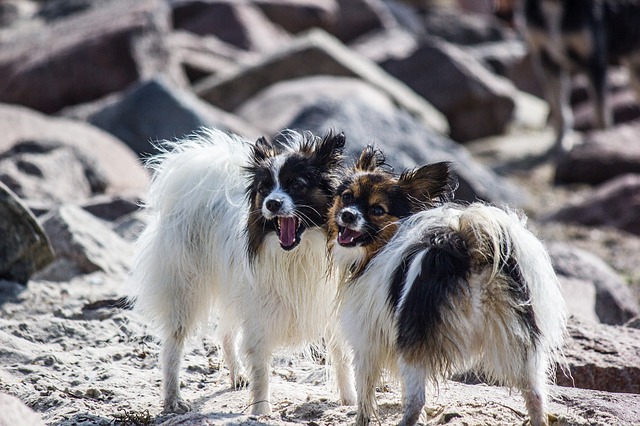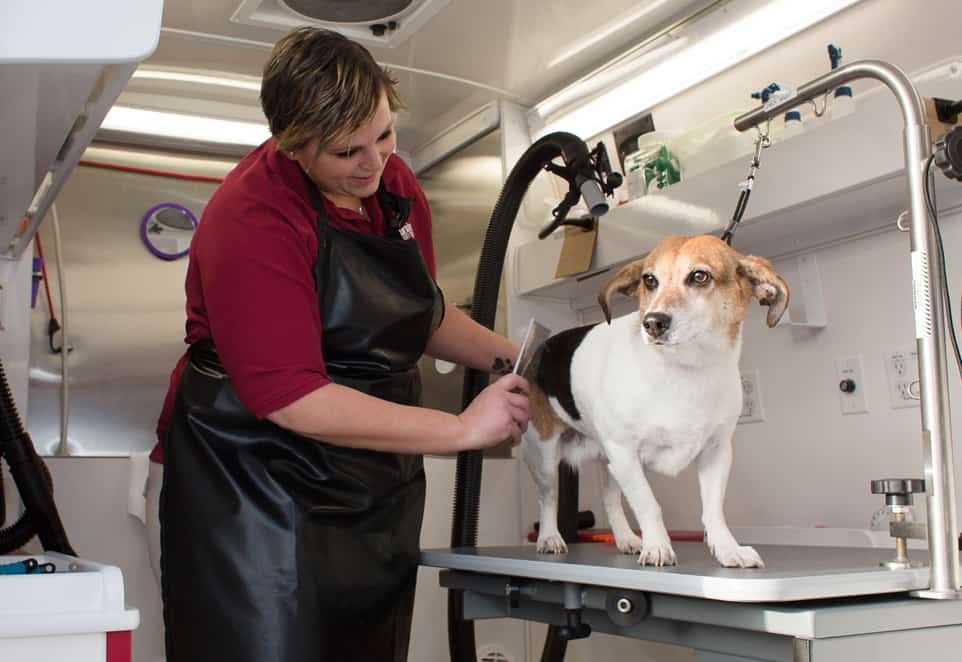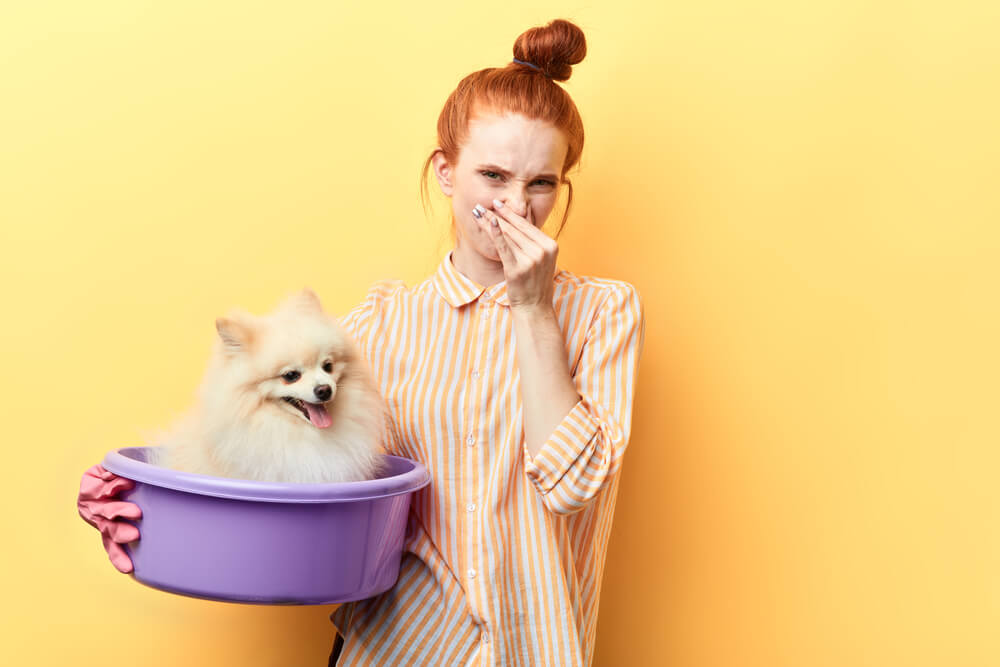Male dogs may smell more than females in some situations.
We will get to that in a bit but first, it’s important to note that all dogs, regardless of gender, have an odor.
Even though gender may play a role, the odor may also be affected by other factors including the breed of the dog, the grooming routine, and the diet of the dog among others.
Why a Male Dog May Smell More Than a Female Dog

Dogs typically produce oils in their sebaceous glands for the purpose of protecting their skin.
These oils may easily accumulate and result in a bad smell—particularly when bacteria and yeast found on the skin start breaking down the accumulated oils. The oxidation of the sebaceous gland fats creates the bad smell. This is true for both males and females.
However, there are some cases where male dogs may have a stronger odor.
Here are a couple of possible explanations:
1. Testosterone
Every male dog has high concentrations of the testosterone hormone which helps to develop male characteristics in the body.
One of the effects of this hormone is that the urine of the dog will smell “more male.”
In fact, dogs that have a higher concentration of testosterone tend to have urine that smells stronger than those that don’t, which may also explain why male dogs may smell more than their female counterparts.
2. Scent Marking
Scent-marking is not reserved for male dogs – females do it too.
However, males are more competitive and tend to practice scent marking more.
The male dog will want to outperform any other dogs in scent marking as a strategy of ensuring their urine is discovered first.
If you are a pet parent, you will easily notice the difference between owning a male and a female dog just by how much scent marking happens.
Apart from the frequency of scent marking, peeing position also contributes to male dogs’ overall scents.
Notably, male dogs tend to make more peeing mistakes while peeing than their female counterparts.
When they are young, they squat and as they mature, they shift to raising their legs.
In the former case, they often spray their front legs and in the latter case, urine tends to flow on the standing leg.
This simply means that they are more likely to end up with urine-wet fur whenever they scent-mark, which makes their overall scent hard to bear.
3. Unneutered Status
Even though there is no scientific evidence to back the claim, we can infer from context that unneutered dogs smell more than neutered ones.
This is because neutering inhibits the testosterone hormone which means the urine of the dog will not smell as bad.
In fact, lots of pet owners notice a significant improvement in smell after neutering their dogs.
Disclaimer: Changes in smell aren’t immediate! If you had your pup neutered today, don’t expect that he start smelling great the following day. Hormones tend to stay in the dog’s system (and in the urine) for quite some time (even for several months) after neutering.
Managing the Smell of Your Male Dog

If you have a male dog that has a strong odor, there are a couple of things you can do to remedy the situation.
Remember, these tips may not work uniformly for every dog because of differences in breeds, diet, etc.
I. Regular Bathing
As we have already seen, the sebaceous gland is one of the causes of odors in dogs.
The best way to deal with this type of odor is to wash your furry baby frequently.
Be sure to use a mild dog-specific shampoo to ensure the odor is completely taken care of by the wash.
That said, you shouldn’t overdo the baths because excessive bathing can strip natural oils from your dog’s coat, which may make the problem even worse.
If you are unsure of the frequency, consult with your vet.
II. Regular Grooming
Establishing a regular grooming routine can also help ensure every dirt and debris is removed from your furry baby’s coat.
The dirt and debris usually trap odors and make your dog smellier than normal.
You may want to concentrate on areas prone to oil buildup, such as the neck and behind the ears.
While at it, trim off any excess hair as it will help in minimizing odor retention.
III. Managing Scent Marking
Scent marking is normal for dogs but if it gets out of hand, your house will always have a lingering odor.
You can discourage the behavior by reducing any high-value resources that might be encouraging your furry friend to scent mark.
Examples of such resources include chew treats, food bowls, beds, bones, and toys.
If you haven’t done it already, you may also want to think of neutering your dog because neutered dogs are less likely to scent-mark.
IV. Adequate Hydration
The hydration status of dogs plays a significant role in the odor intensity of their urine.
When dogs consume ample amounts of water, their urine becomes more diluted, resulting in a less pungent odor.
On the other hand, dogs that seldom drink water will have more concentrated urine, which tends to have a stronger smell.
Adequate hydration not only promotes overall health but also helps maintain a balanced urine composition.
Encouraging your dog to drink sufficient water ensures proper hydration, potentially reducing the potency of their urine odor.
V. Consult a Veterinarian
Even though it is normal for male dogs to smell more than females, the smell shouldn’t be too much.
If the smell is getting unbearable, there is a chance something is wrong.
You can watch out for other tell-tale signs of illness like infections, skin irritations, discomfort, etc.
If you notice any of these signs, you may want to take your furry baby to the vet clinic for a checkup in order to rule out any underlying health conditions that may be contributing to the odor.
As an Amazon Associate, we may receive a small commission from qualifying purchases but at no extra cost to you. Learn more. Amazon and the Amazon logo are trademarks of Amazon.com, Inc, or its affiliates.

